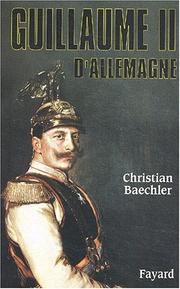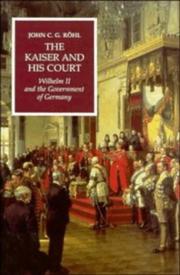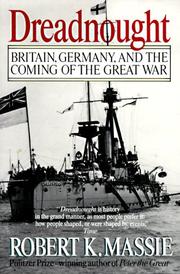| Listing 1 - 10 of 44 | << page >> |
Sort by
|
Book
ISBN: 9781107072251 1107072255 9781107420779 1107420776 9781139680394 1316057879 1316055507 1139680390 Year: 2014 Publisher: Cambridge Cambridge University Press
Abstract | Keywords | Export | Availability | Bookmark
 Loading...
Loading...Choose an application
- Reference Manager
- EndNote
- RefWorks (Direct export to RefWorks)
Kaiser Wilhelm II (1859-1941) is one of the most fascinating figures in European history, ruling Imperial Germany from his accession in 1888 to his enforced abdication in 1918 at the end of the First World War. In one slim volume, John Röhl offers readers a concise and accessible survey of his monumental three-volume biography of the Kaiser and his reign. The book sheds new light on Wilhelm's troubled youth, his involvement in social and political scandals, and his growing thirst for glory, which, combined with his overwhelming nationalism and passion for the navy provided the impetus for a breathtaking long-term goal: the transformation of the German Reich into one of the foremost powers in the world. The volume examines the crucial role played by Wilhelm as Germany's Supreme War Lord in the policies that led to war in 1914. It concludes by describing the rabid anti-Semitism he developed in exile and his efforts to persuade Hitler to restore him to the throne.
Book
ISBN: 9780521844314 9781139046275 9781107544192 9781107731752 1107731755 1139046276 0521844312 1107720303 1139890220 1107727642 1107730007 110772824X 110754419X Year: 2013 Publisher: Cambridge [England]
Abstract | Keywords | Export | Availability | Bookmark
 Loading...
Loading...Choose an application
- Reference Manager
- EndNote
- RefWorks (Direct export to RefWorks)
This final volume of John Röhl's acclaimed biography of Kaiser Wilhelm II reveals the Kaiser's central role in the origins of the First World War. The book examines the Kaiser's part in the Boer War, the Russo-Japanese War, the naval arms race with Britain and Germany's rivalry with the United States as well as in the crises over Morocco, Bosnia and Agadir. It also sheds new light on the public scandals which accompanied his reign from the allegations of homosexuality made against his intimate friends to the Daily Telegraph Affair. Above all, John Röhl scrutinises the mounting tension between Germany and Britain and the increasing pressure the Kaiser exerted on his Austro-Hungarian ally from 1912 onwards to resolve the Serbian problem. Following Germany's defeat and Wilhelm's enforced abdication, he charts the Kaiser's bitter experience of exile in Holland and his frustrated hopes that Hitler would restore him to the throne.
William --- Germany --- Allemagne --- Politics and government --- History --- Politique et gouvernement --- Histoire --- Vilʹgelʹm --- Wilhelm --- Guilelmus --- Wei-lien --- Vilkhelm --- Friedrich Wilhelm Viktor Albert, --- Guillaume --- Guillermo --- Arts and Humanities
Book
ISBN: 019187244X 0192571176 0192571184 Year: 2018 Publisher: Oxford : Oxford University Press,
Abstract | Keywords | Export | Availability | Bookmark
 Loading...
Loading...Choose an application
- Reference Manager
- EndNote
- RefWorks (Direct export to RefWorks)
From renowned scholar William A. Schabas, this title sheds light on perhaps the most important international trial that never was: that of Kaiser Wilhelm II following the First World War. Schabas draws on numerous primary sources hitherto unexamined in published work, to craft a history of the very beginnings of international criminal justice.
World War, 1914-1918 --- Public opinion. --- William --- Europe --- Intellectual life --- Foreign public opinion --- Vilʹgelʹm --- Wilhelm --- Guilelmus --- Wei-lien --- Vilkhelm --- Friedrich Wilhelm Viktor Albert, --- Guillaume --- Guillermo

ISBN: 1107137195 1280163429 0511121334 0511204930 0511062184 0511307802 0511496796 0511070640 9780511062186 0521824087 9780521824088 9780511070648 9780511121333 9780511496790 6610163421 9786610163427 9780521179805 0521179807 9781107137196 9781280163425 9780511204937 9780511307805 Year: 2003 Publisher: Cambridge, UK New York Cambridge University Press
Abstract | Keywords | Export | Availability | Bookmark
 Loading...
Loading...Choose an application
- Reference Manager
- EndNote
- RefWorks (Direct export to RefWorks)
This collection of innovative essays examining the role of Wilhelm II in Imperial Germany was first published in 2003, particularly on the later years of the monarch's reign. The essays highlight the Kaiser's relationship with statesmen and rulers; his role in international relations; the erosion of his power during the First World War; and his ultimate downfall in 1918. The book demonstrates the extent to which Wilhelm II was able to exercise 'personal rule', largely unopposed by the responsible government, and supported in his decision-making by his influential entourage. The essays are based on thorough and far-reaching research and on a wide range of archival sources. Written to honour the innovative work of John Röhl, Wilhelm II's most famous biographer, on his sixty-fifth birthday, the essays within this volume will continue to provide an exciting evaluation of the role and importance of this controversial monarch.
William --- Vilʹgelʹm --- Wilhelm --- Guilelmus --- Wei-lien --- Vilkhelm --- Friedrich Wilhelm Viktor Albert, --- Guillaume --- Guillermo --- Germany --- Kings and rulers. --- Foreign relations --- Kings and rulers --- Military policy. --- Politics and government --- Arts and Humanities --- History
Book
ISBN: 9781847010322 9781919895475 1847010326 1919895477 9781846159374 9786613772480 1846159377 1281017183 Year: 2011 Publisher: Cape Town, South Africa UCT Press
Abstract | Keywords | Export | Availability | Bookmark
 Loading...
Loading...Choose an application
- Reference Manager
- EndNote
- RefWorks (Direct export to RefWorks)
In 1904, the indigenous Herero people of German South West Africa (now Namibia) rebelled against their German occupiers. In the following four years, the German army retaliated, killing between 60,000and 100,000 Herero people, one of the worst atrocities ever. The history of the Herero genocide remains a key issue for many around the world partly because the German policy not to pay reparations for the Namibian genocide contrasts with its long-standing Holocaust reparations policy. The Herero case bears not only on transitional justice issues throughout Africa, but also on legal issues elsewhere in the world where reparations for colonial injustices have been called for.
This book explores the events within the context of German South West Africa (GSWA) as the only German colony where settlement was actually attempted. The study contends that the genocide was not the work of one rogue general or the practices of the military, but that it was inexorably propelled by Germany's national goals at the time. The book argues that the Herero genocide was linked to Germany's late entry into the colonial race, which led it frenetically and ruthlessly to acquire multiple colonies all over the world within a very short period, using any means available.
Jeremy Sarkin is Chairperson-Rapporteur of the United Nations Working Group on Enforced or Involuntary Disappearances, and is at present Distinguished Visiting Professor of Law at Hofstra University in Hempstead, New York. He is also an Attorney of the High Court of South Africa and of the State of New York. A graduate of the University of the Western Cape and of Harvard Law School he has been visiting professor at several US universities where he has taught Comparative Law, International Human Rights Law, International Criminal Law and Transitional Justice
Southern Africa (South Africa, Botswana, Lesotho, Swaziland, Namibia and Zimbabwe): University of Cape Town Press/Juta
Genocide --- Herero (African people) --- Génocide --- Herero (Peuple d'Afrique) --- History --- Histoire --- William --- Namibia --- Namibie --- Génocide --- Cleansing, Ethnic --- Ethnic cleansing --- Ethnic purification --- Ethnocide --- Purification, Ethnic --- Crime --- Vilʹgelʹm --- Wilhelm --- Guilelmus --- Wei-lien --- Vilkhelm --- Friedrich Wilhelm Viktor Albert, --- Guillaume --- Guillermo --- History. --- German South West Africa. --- Germany's national goals. --- Herero genocide. --- Kaiser Wilhelm II. --- colonial injustices. --- colonial race. --- transitional justice.

ISBN: 2213615578 9782213615578 Year: 2003 Publisher: Paris: Fayard,
Abstract | Keywords | Export | Availability | Bookmark
 Loading...
Loading...Choose an application
- Reference Manager
- EndNote
- RefWorks (Direct export to RefWorks)
William --- Germany --- Kings and rulers --- Biography --- Politics and government --- capuccinia --- Vilʹgelʹm --- Wilhelm --- Guilelmus --- Wei-lien --- Vilkhelm --- Friedrich Wilhelm Viktor Albert, --- Guillaume --- Guillermo --- William - II, - German Emperor, - 1859-1941 --- Germany - Kings and rulers - Biography --- Germany - Politics and government - 1888-1918 --- GUILLAUME II (ROI DE PRUSSE ET EMPEREUR D'ALLEMAGNE), 1859-1941 --- BIOGRAPHIE

ISBN: 0521402239 0521565049 1316347346 1316344908 131634567X 1316346218 1316348474 1316347931 1316529827 9781316348475 9781316346211 Year: 1996 Publisher: Cambridge Cambridge University Press
Abstract | Keywords | Export | Availability | Bookmark
 Loading...
Loading...Choose an application
- Reference Manager
- EndNote
- RefWorks (Direct export to RefWorks)
Kaiser Wilhelm II, Queen Victoria's eldest grandchild, took over the running of the powerful German Reich from Bismarck and within a couple of decades had led it into world war and collapse. How did the Kaiser come to have so much power? Why was there no one to help him steer a less disastrous course? This book analyses these crucial questions with the help of a wealth of new archival sources. The book begins with a character-sketch of the Kaiser which provides new and alarming insights into his personality. It then looks, crucially, at the Kaiser's friends and favourites, the neo-absolutist culture of the court and of Berlin court society, and at the nature of his relationship with the court on the one hand and with the administrative 'pyramid' in Prussia and the Reich on the other. The book makes clear that these bureaucrats and diplomats had neither the means nor the will to oppose the overwhelming determination of the Kaiser and his close friends and advisers in directing the policies of the most dynamic and volatile state in Europe. The dangerous consequences of this situation led to the brink of world war as early as December 1912. A final chapter reveals for the first time the appalling extent and nature of the exiled Kaiser's anti-semitism.
William --- Guillaume --- Views on Jews. --- Et les juifs --- Germany --- Allemagne --- Kings and rulers --- Biography --- Politics and government --- Rois et souverains --- Biographies --- Politique et gouvernement --- 1888-1918 --- William II --- William - II, - German Emperor, - 1859-1941. --- Biography. --- Vilʹgelʹm --- Wilhelm --- Guilelmus --- Wei-lien --- Vilkhelm --- Friedrich Wilhelm Viktor Albert, --- Guillermo --- Monarchs. --- William II, German Emperor
Book
ISBN: 9780141019987 0141019980 Year: 2010 Publisher: London Penguin Books
Abstract | Keywords | Export | Availability | Bookmark
 Loading...
Loading...Choose an application
- Reference Manager
- EndNote
- RefWorks (Direct export to RefWorks)
World War, 1914-1918 --- Diplomatic history --- George --- William --- Nicholas --- Romanov, Nicholas Alexandrovich --- Romanov, Nicholas Alexandrovitch --- Romanov, Nicolas Alexandrovich --- Romanov, Nicolas Alexandrovitch --- Romanov, Nicholas Alexandrovitsj --- Romanov, Nicolas Alexandrovitsj --- Vilʹgelʹm --- Wilhelm --- Guilelmus --- Wei-lien --- Vilkhelm --- Friedrich Wilhelm Viktor Albert, --- Guillaume --- Guillermo --- ג׳ורג׳ --- Europe --- Great Britain --- Germany --- Russia --- History --- Kings and rulers --- Politics and government --- Foreign relations
Book
ISBN: 9783110194418 Year: 2008 Publisher: Berlin Walter de Gruyter
Abstract | Keywords | Export | Availability | Bookmark
 Loading...
Loading...Choose an application
- Reference Manager
- EndNote
- RefWorks (Direct export to RefWorks)
Das unverzichtbare Standardwerk der modernen Märchen- und Erzählforschung dokumentiert erstmals umfassend sämtliche zu Lebzeiten der Brüder Grimm erschienenen Märchen. Jedes wird in seiner Entstehungs- und Wirkungsgeschichte unter Berücksichtigung der wichtigsten internationalen Forschungsliteratur ausführlich kommentiert, wobei das besondere Augenmerk thematischen Vernetzungen innerhalb der Sammlung und des Gesamtwerks der Brüder Grimm sowie den Adaptions- und Revitalisierungsprozessen in den verschiedensten literarischen Gattungen und audiovisuellen Medien gilt. Das Handbuch dokumentiert die unterschiedlichen Phasen der Textbearbeitung und widerlegt verbreitete Irrtümer der Forschung. Ein ausführliches Nachwort erörtert die Entstehungsgeschichte der Sammlung, das kulturhistorische Umfeld sowie konkurrierende und weiterführende Unternehmungen. Ein umfangreiches Namen-, Werk- und Sachregister sowie Register zu Märchentiteln, Märchentypen, Motiven, Quellen und Beiträgern erlauben das gezielte Aufsuchen von Informationen und verdeutlichen unterschiedlichste Bezüge.
Grimm [Brothers] --- Fairy tales --- History and criticism. --- History and criticism --- Grimm, Jacob, --- Grimm, Wilhelm, --- Grimm [Gebroeders] --- Grimm, Wilhelm --- Grimm, Jacob --- Grimm, Wilhelm. --- Grim, Vilkhelm, --- Grimm, Guglielmo, --- Grimm, Vilʹgelʹm Karl, --- Grimm, Wilhelm Karl, --- Grimm Brothers --- Brothers Grimm --- Brüder Grimm --- Bratʹi︠a︡ Grimm --- Braty Grimm --- Krim eghbayrner --- Гримм, Вильгельм, --- ברודער גרים --- גרים וילהלם --- גרים, ווילהלם --- גרים, וילהלם --- גרים, וילהלם, --- CONTES DE FEES --- GRIMM (FRERES) --- ALLEMAGNE --- 19e SIECLE --- KINDER- UND HAUSMÄRCHEN

ISBN: 0345375564 Year: 1992 Publisher: New York Ballantine
Abstract | Keywords | Export | Availability | Bookmark
 Loading...
Loading...Choose an application
- Reference Manager
- EndNote
- RefWorks (Direct export to RefWorks)
World War, 1914-1918 --- #SBIB:327.6H21 --- #SBIB:94H0 --- Causes --- Internationale en diplomatieke relaties tot en met de Eerste Wereldoorlog --- Geschiedenis van Europa: algemeen --- Edward --- William --- Vilʹgelʹm --- Wilhelm --- Guilelmus --- Wei-lien --- Vilkhelm --- Friedrich Wilhelm Viktor Albert, --- Guillaume --- Guillermo --- Albert Edward, --- ايڈورڈ هفتم، --- Europe --- Germany --- Great Britain --- Politics and government --- History --- History of the United Kingdom and Ireland --- History of Germany and Austria --- anno 1800-1899 --- anno 1900-1909 --- anno 1910-1919
| Listing 1 - 10 of 44 | << page >> |
Sort by
|

 Search
Search Feedback
Feedback About UniCat
About UniCat  Help
Help News
News